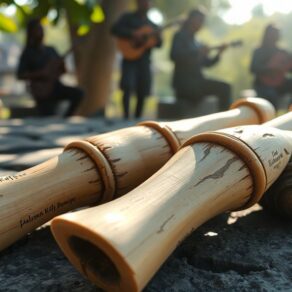Wind instruments, especially flutes, play a vital role in ceremonies by embodying cultural stories and fostering spiritual connections. You'll find they serve as conduits for rituals, symbolizing unity and shared heritage across various traditions. Flutes invoke collective emotions, enhancing communal bonds during significant life events like weddings and religious observances. Their ethereal tones also resonate with the divine, marking sacred moments in ceremonies. Festivals highlight their importance, showcasing a rich cultural legacy. As you explore further, you'll uncover more about their evolving role in contemporary practices and the deep emotional ties they cultivate within communities.
Key Takeaways
- Wind instruments, like flutes, serve as vessels for storytelling, preserving cultural narratives and traditions during ceremonies across various cultures.
- The ethereal sounds of wind instruments symbolize the connection between the earthly and spiritual realms, enhancing spiritual experiences during rituals.
- Wind instruments foster communal ties, creating collective participation and bonding experiences that reflect shared heritage during ceremonial gatherings.
- They play a crucial role in marking significant life events, such as births and weddings, enriching the emotional depth of ceremonies.
- Cultural festivals celebrate wind instruments, promoting artistic exchange and bridging generational gaps through shared musical experiences.
Historical Overview of Flutes
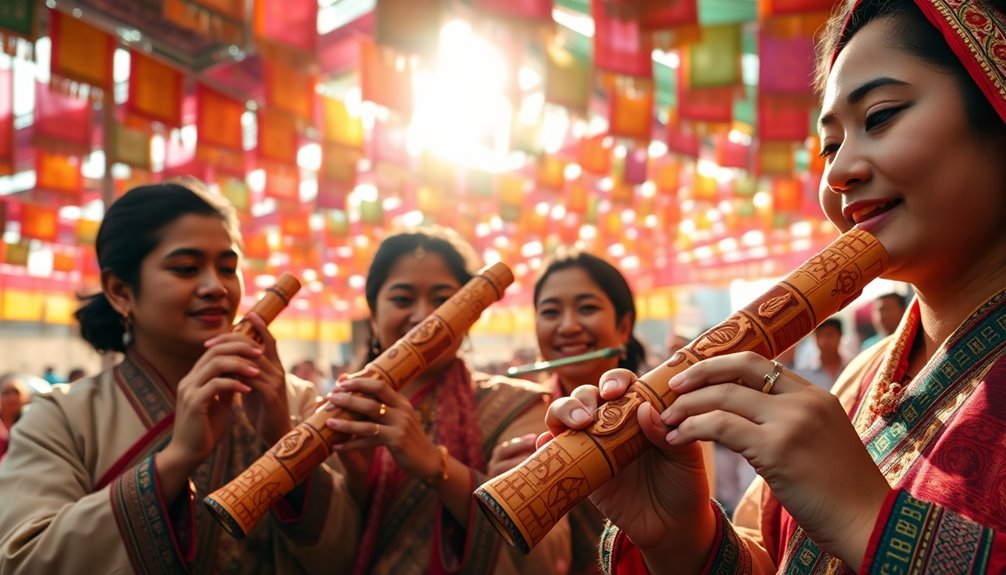
Throughout history, flutes have played a pivotal role in various cultures, offering a window into the musical expressions of different societies. You might be fascinated to learn that these instruments boast ancient origins, dating back thousands of years. Archaeologists have discovered flutes made from bones and reeds in regions like Europe and Asia, showcasing the early human desire for musical creativity.
These artifacts reveal not just a passion for sound, but also a deeper connection to community and ritual.
As you explore the evolution of the flute, you'll notice how its design has transformed considerably over time. Early flutes, often simple and crafted from natural materials, evolved into more sophisticated instruments. The introduction of key mechanisms in the 19th century, for instance, allowed players to access a broader range of notes, enhancing both performance and composition. Additionally, the development of the concert flute as a staple in orchestras exemplifies this evolution.
This evolution reflects not only technological advancement but also the changing demands of music across cultures.
Flutes have served varied purposes throughout history, from ceremonial use in ancient rituals to their role in folk traditions. As you investigate their significance, you'll see that these instruments foster a sense of belonging, bringing communities together through shared musical experiences.
They've been a means of storytelling, celebration, and even healing, illustrating how deeply intertwined music is with human connection. Understanding the historical journey of flutes enriches your appreciation for music as a universal language that transcends time and culture.
Flutes in Indigenous Traditions
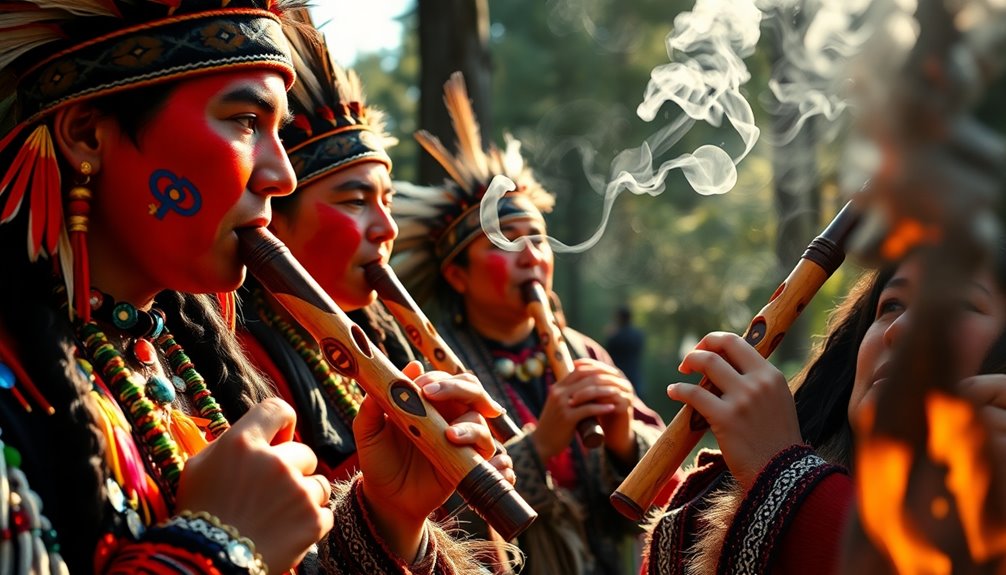
Flutes have not only evolved in design and function but have also found unique expressions within indigenous cultures around the world. In these communities, flutes serve as more than mere musical instruments; they're crucial vessels for storytelling and cultural continuity. You'll find that flute craftsmanship varies greatly, reflecting the diverse traditions and environments of each group.
Take a look at how different indigenous cultures interpret the flute:
| Culture | Key Features of Flute Use |
|---|---|
| Native American | Often used in rituals, storytelling, and healing |
| Andean | Associated with agricultural festivals and community gatherings |
| Australian | Used in Dreamtime stories, connecting the past with the present |
| African | Integral in social ceremonies, symbolizing unity and identity |
| Inuit | Represents the voice of nature and is played during gatherings |
Through indigenous storytelling, flutes communicate narratives that connect people to their ancestors and the natural world. Each note played can evoke memories, emotions, and a sense of belonging, reaffirming cultural identity. In many cases, the flute is crafted from locally sourced materials, enhancing its connection to the land and the community. Additionally, the Western Concert Flute has influenced various indigenous interpretations, showcasing the instrument's adaptability across different musical contexts.
Religious Ceremonies and Flute Music
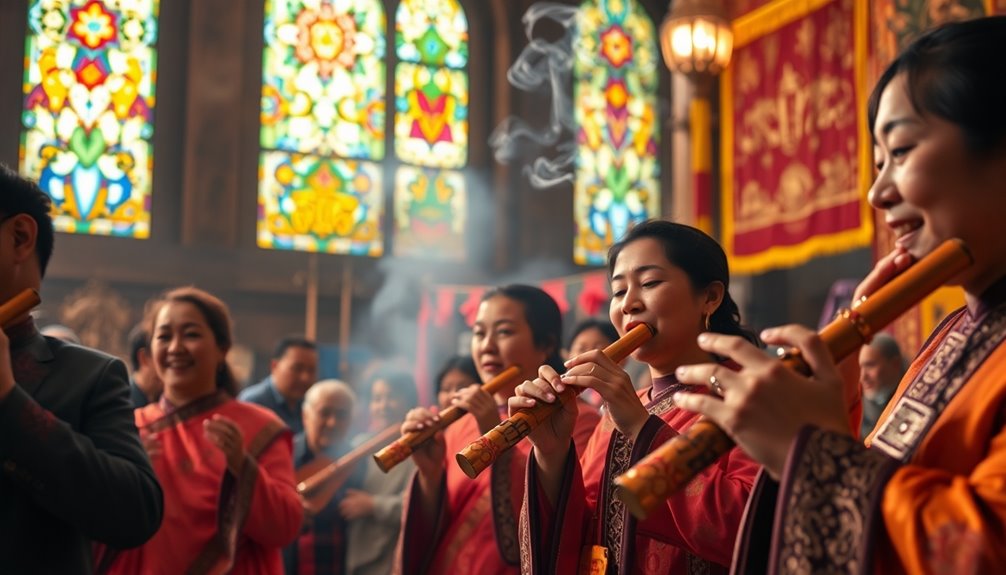
In many cultures, the role of flute music in religious ceremonies surpasses mere entertainment; it becomes an essential conduit for spiritual expression and communal connection. The soothing tones of the flute resonate deeply within the hearts of participants, forging a strong sense of belonging and unity. As you listen, you might feel the melodies acting as melodic prayers, guiding you toward a more profound spiritual experience.
Flute music often serves several key purposes in these ceremonies:
- Facilitating spiritual connections: The music elevates the atmosphere, inviting participants to engage more deeply with their beliefs.
- Enhancing communal bonds: Shared musical experiences foster a sense of togetherness among attendees, reinforcing their collective identity.
- Symbolizing transcendence: The ethereal sounds of the flute can evoke feelings of moving beyond the earthly domain, connecting listeners with the divine.
- Marking sacred moments: Flute performances often accompany rituals, signifying important changes or milestones in the spiritual journey.
In these sacred settings, the flute emerges as more than just an instrument; it embodies the voice of the community's spiritual heritage. The concert flute, with its bright and clear sound, often leads the way in these ceremonial performances, enhancing the overall spiritual ambiance.
When you experience flute music during a religious ceremony, you're not just hearing notes; you're participating in a rich tapestry of tradition and connection. The melodic prayers intertwine with your own thoughts and feelings, creating a shared experience that transcends individual beliefs, drawing you closer to the essence of the divine and the collective spirit of your community.
Cultural Festivals Featuring Flutes
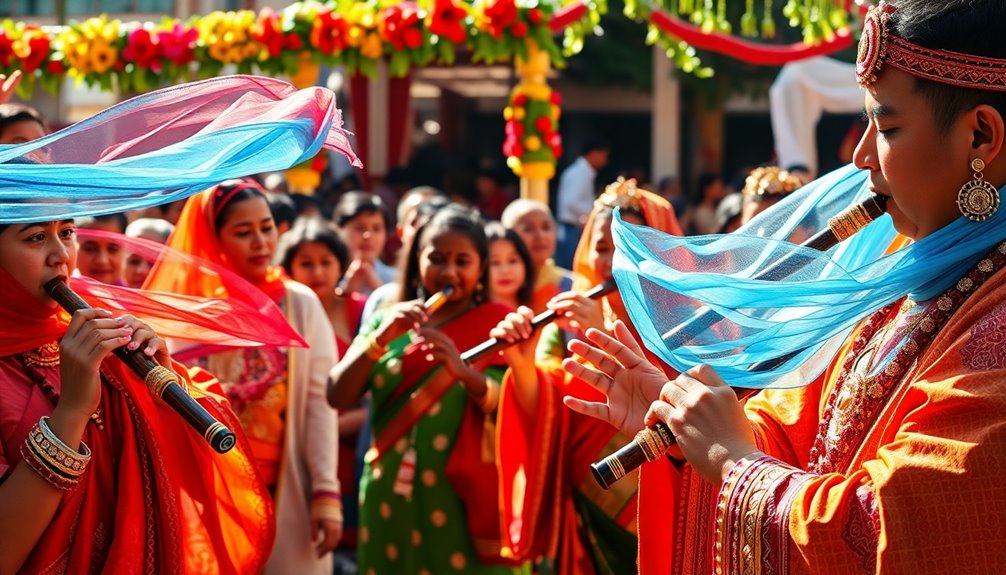
Amidst vibrant celebrations worldwide, cultural festivals featuring flutes showcase the instrument's rich heritage and versatility. Whether you find yourself in a small village or a bustling city, the enchanting melodies of flute performances can transport you into a world of tradition and community. Festivals such as the Japanese Kiku Matsuri or the Indian Bansuri Utsav highlight not just musical talent, but also the importance of cultural identity and connection.
During these festivals, flute performances often serve as a bridge between generations, inviting everyone to participate. You may notice seasoned musicians sharing the stage with young talents, creating a dialogue between the past and the present. This exchange enriches the festival traditions, ensuring that the art of flute playing continues to thrive.
The air is filled with a sense of belonging as you witness how each note resonates with listeners, evoking memories and emotions tied to the cultural narratives that define the community. As you immerse yourself in the rhythm and sound, it becomes clear that these festivals are more than mere entertainment; they're a celebration of shared heritage. The combination of cultural significance and musical expression makes these events truly unforgettable.
You'll feel the spirit of unity among attendees, as everyone comes together to appreciate the artistry of flute music. In this way, cultural festivals featuring flutes not only honor the instrument itself but also reinforce the bonds that tie individuals to their cultural roots, making you feel part of something larger than yourself.
Symbolism of Flutes in Rituals
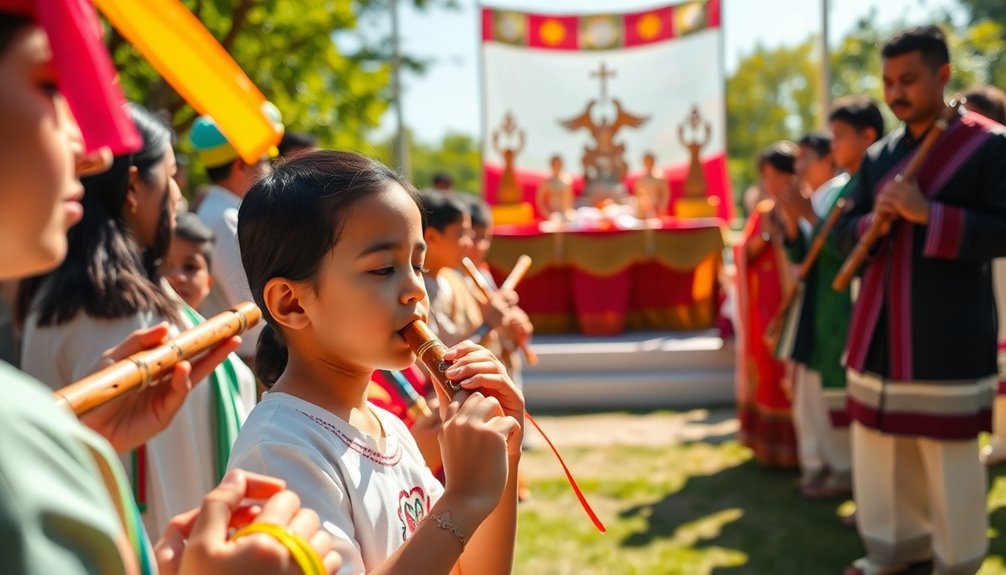
The gentle breath of a musician transforms a simple piece of bamboo into a powerful symbol of connection between the earthly and the spiritual. In various cultures, flutes embody a profound flute symbolism that transcends mere sound.
As you explore the ritual significance of flutes, you discover how they serve as conduits for expressing the collective spirit, invoking deities, and marking life's changes.
During sacred ceremonies, the flute's melodic tones often carry intentions and prayers, weaving a tapestry of shared experience. This instrument's ethereal quality resonates with the divine, helping participants feel connected to something greater than themselves.
Consider these essential aspects of flute symbolism in rituals:
- Invocation: Flutes often call forth spirits or ancestors, inviting their presence into the ceremony.
- Change: They mark significant life events, such as births, weddings, or memorials, guiding individuals through emotional landscapes.
- Healing: The soothing sounds can promote emotional and spiritual healing, creating a safe space for reflection.
- Unity: Flute music fosters a sense of belonging, bringing communities together in shared moments of reverence.
Additionally, the variety of flutes, such as the concert flute and the bansuri, contributes to their unique cultural expressions and meanings in these rituals.
Contemporary Uses of Flutes in Ceremonies
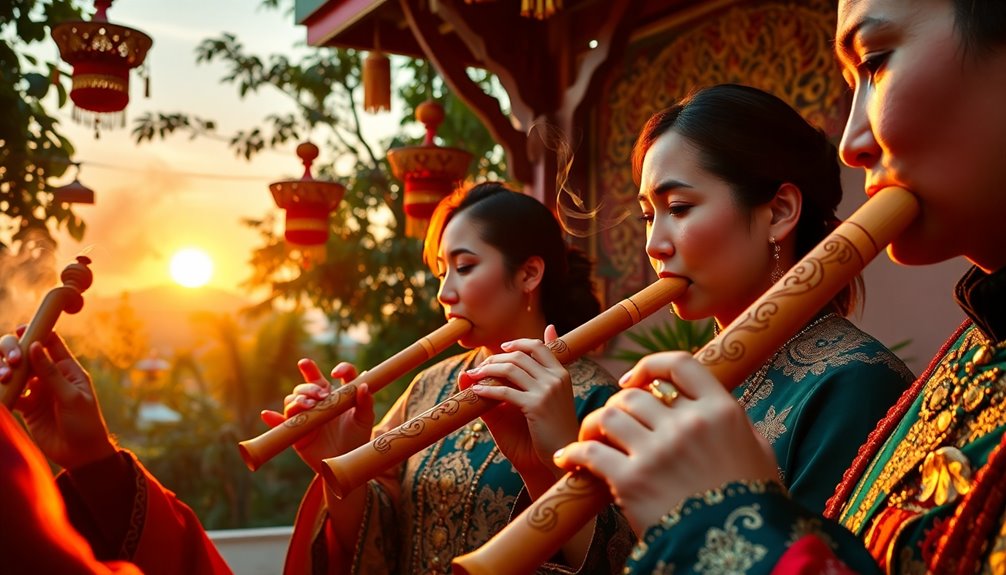
Flutes play a vital role in contemporary ceremonies, bridging traditions and modern expressions of spirituality. You'll find that the modern flute, with its sleek design and versatile sound, has become a prominent instrument in various ceremonial contexts. Whether it's a wedding, a memorial, or a cultural festival, the ethereal tones of flute compositions create an atmosphere that resonates deeply with participants, inviting them to engage with their emotions.
In many spiritual gatherings, flutes serve as a conduit for connection—both among individuals and with the divine. The sound of the flute can evoke a sense of unity and peace, encouraging those present to reflect and find solace in the moment. You might notice that contemporary composers often blend traditional melodies with modern influences, resulting in flute compositions that resonate with diverse audiences. This fusion allows for a richer experience, as the familiar notes of a traditional piece intertwine with innovative harmonies.
Moreover, in community-centered ceremonies, flutes often symbolize a shared heritage, reminding you of the importance of collective memory. When played, they summon feelings of belonging, bridging generational gaps. The modern flute becomes not just an instrument, but a voice that speaks to the shared human experience, transcending time and culture. Additionally, the emotional depth of flute music enhances storytelling within these ceremonies, weaving narratives that enrich the overall experience.
In this way, contemporary uses of flutes in ceremonies enrich communal bonds, fostering a sense of togetherness in a world that craves connection.
Frequently Asked Questions
How Do Different Cultures Define the Role of Wind Instruments in Ceremonies?
Different cultures define the role of wind instruments in ceremonies through their unique cultural symbolism and ritual significance.
You'll notice that these instruments often embody the spirit of the community, representing connection and continuity.
In some traditions, they're believed to summon ancestral spirits, while in others, they mark changes or celebrations.
What Are the Common Materials Used in Making Ceremonial Flutes?
When it comes to making ceremonial flutes, you've got to contemplate the materials.
Wood types like bamboo, cedar, and maple often steal the show, each carrying its own cultural symbolism. For instance, bamboo represents resilience, while cedar embodies purification.
These choices aren't just random; they're steeped in tradition, reflecting the values and beliefs of the community.
How Do Modern Technologies Influence Traditional Flute-Making Techniques?
Modern technologies reshape traditional flute-making techniques by integrating digital craftsmanship into the process.
You can now design intricate patterns and personalize flutes using software, making the art more accessible.
Plus, the focus on sustainable materials like bamboo or recycled woods not only preserves nature but also adds a unique character to each instrument.
This blend of old and new creates flutes that resonate with deeper meaning, enhancing your connection to the music and its heritage.
Are There Specific Techniques for Playing Flutes in Ceremonial Contexts?
When you play flutes in ceremonial contexts, mastering flute improvisation techniques is essential.
You'll find that incorporating ceremonial flute embellishments adds depth and emotion to your performance. These techniques often involve rhythmic variations and melodic flourishes that resonate with the audience.
What Are Some Notable Composers of Flute Music for Ceremonies?
When exploring notable composers of flute music for ceremonies, you'll find a rich tapestry of styles.
Baroque composers like Johann Sebastian Bach and Georg Philipp Telemann crafted intricate flute pieces that capture the grandeur of the era.
In contrast, contemporary composers such as Kaija Saariaho and Ian Clarke push boundaries, blending traditional techniques with modern influences.
Their works resonate deeply, inviting you to connect with the emotional depths of each ceremonial moment through the flute's voice.
Conclusion
To sum up, flutes foster a mesmerizing fusion of history and harmony in ceremonies. Their melodic magic resonates deeply, symbolizing spirituality and storytelling across cultures. Whether in sacred settings or spirited celebrations, these wind instruments weave a wondrous tapestry of tradition and transformation. As you explore their enduring essence, you'll discover how flutes not only enhance events but also echo the emotions and experiences that bind communities together, creating a fascinating connection to the past and present.





